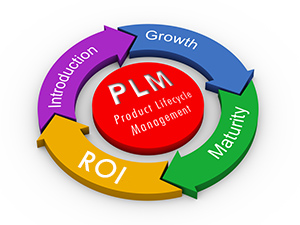
Product Lifecycle Management:

PLM is a process of managing the whole data of any product and its lifecycle from conceptualization to obsolete which includes engineering design, manufacturing process, service information, and delivery of manufactured products.
Aerospace, medical device, military, and nuclear industries, where the safety and control tracking are very important, started practicing a kind of data organization process. First, they originated the discipline of configuration management (CM), this later evolved as an electronic data management system (EDMS), which then further matured to product data management (PDM). Today, all product manufacturing industries are using PLM as the backbone of their business.
PLM Solution Services:
The PLM solution is majorly classified into two type of services
- PLM Business Process Consulting
- PLM Technology Implementation
PLM Business Process Consulting:
This is where we could help understand the clients about their entire PLM journey. During this phase, we usually help clients to visualize the improvements of their employees, resources, and technology through their PLM vision. Following are some of the core elements of PLM business process consulting,
- Strategic Planning – To define the expected destination where you want to go in your PLM journey.
- Business Process Enablement – Streamlining and optimizing the business process to effectively adapt your PLM journey. This is a key element for the PLM journey.
- Capability Maturity Assessment – Assessing whether PLM capability is under-utilized on any of the process areas and help to improve such process and get you to get the most benefit out of the PLM software/applications.
- Organizational Change Management – We understand the real problem of introducing a new way of working and we are committed to getting your people better adopted with the new changes in their day to day work and direct them and the organization into a successful PLM journey.
- Training & Organizational Readiness – Training of the users to the new tool and features are imperative for the success of the PLM journey. This is not only the end-users but also few local administrators to support the continuous business. We provide comprehensive training to both end-users and administrators.
- Vendor Selection – Market has so many choices, we will help bring clarity through analyzing your business strategy, already used legacy systems, other enterprise software that will communicate with PLM, etc.… Deciding the right PLM software and Vendor is the most important step in the PLM journey.
PLM Technology Implementation:
This where we will help our customers to implement the selected PLM software to suit their business processes. We are very well knowledge to implement any leading PLM software in the industry. The following are some core elements or competencies we possess to help our clients.
- Partial / End to end PLM implementation – As a PLM solution provider, we have rich and versatile skillsets within our firm to implement any type of PLM solutions as per client need. While doing the implementation, we follow
- System Architecture design – only if the end – to end implementation
- Solution Architecture design
- Best in class implementation framework
- Security measure
- Validation & Verification
- System/application upgrade – We support our clients to keep them a step ahead in the race. Our efficient upgrade process consists of,
- GAP analysis both on the system specification and the application
- Upgrading the system through using Vendor provided tools and process
- Upgrading the application code through best in class methodology
- Additional installations
- Additional customization to fill the GAP
- Routine validation & Verification
- Hyper care
- Data migration – We provide efficient data migration services to our clients. We use best in class methodologies for all data migration. In all their types, we will use the optimal approach for data extraction however, we always use the vendor-provided tool to load the data
- GAP analysis (between As-Is and To be systems)
- Legacy system to PLM migration
- Legacy PLM system to PLM migration
- Legacy ERP system to PLM migration
- Desktop data to PLM migration
- Enterprise Integration – We use a standard framework when it comes to enterprise software integration.
- PLM to ERPs through bi-directional communication. The non-supported ERPs (vendor does not directly support some old ERPs) can also be integrated through our custom solution framework
- PLM to Corporate LDAP integration
- PLM to Catalog generator
- PLM to publishing engines
- PLM to any other compliance standards servers
- Application maintenance support / Run time support – We provide application support based on the ITIL framework recommendations. We provide all levels of support as described in ITIL.
